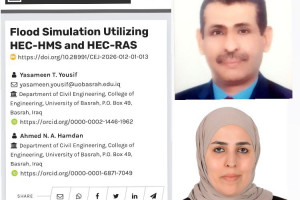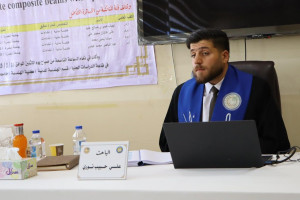A master's thesis in the College of Engineering at the University of Basrah discusses (the structural behavior of self-compacting concrete bridges), the thesis presented by the student Maryam Asim Muhammad dealt with two parts: the first part is experimental work by testing fresh self-compacting concrete, and the second part is experimental work by casting and testing self-compacting concrete beams. Work is made experimental test of twenty mixtures of self-compacting concrete with the replacement of part of the cement at percentages (0%) (1%, 3%, 5%, 7,5%) of clay powder for the size of the sieve 75 and 80 microns to study its effect on characteristics of the cement mix in both the fresh and hardened state of concrete with a design strength of 35 and 40 MPa. The second part of the experimental work consisted of testing fourteen beams of reinforced concrete with or without powdered clay bricks under the influence of increasing loads, and the maximum load, deflection, and cracking pattern were recorded. 7 beams with self-compressing concrete with a compressive strength of about 35 MPa in 28 days, and 8 beams with self-compressing concrete with a compressive strength of about 40 MPa in 28 days. The main objective of this dissertation is to study the bending behavior of self-compressing concrete beams and their uses Clay brick powder residue The thesis concluded that the beams with increasing the content of clay brick powder will affect the behavior of the self-compacting concrete bridge due to the increase in the water absorption of the clay brick powder, Thus, adding water to compensate for the potential absorption reduces the absolute density, as the percentage of water increases.







